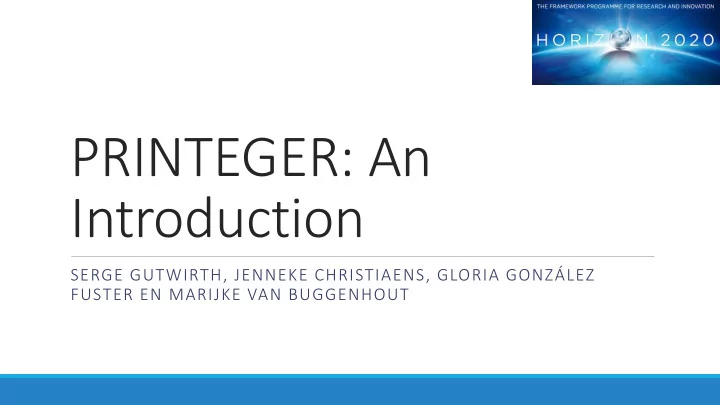

PRINTEGER: An Introduction SERGE GUTWIRTH, JENNEKE CHRISTIAENS, GLORIA GONZÁLEZ FUSTER EN MARIJKE VAN BUGGENHOUT
Promoting Integrity as an Integral Dimension of Excellence in Research Project period: September 2015 until 2018 Action Funding: EC H2020, Science with and for Society Stichting Katholieke Universiteit Nijmegen (coordinator) Hub Zwart/Willem Halffman The Netherlands University of Tartu Margit Sutrop Estonia Vrije Universiteit Brussel Serge Gutwirth Belgium Oslo and Akershus University College Ellen-Marie Forsberg Norway University of Bonn Sandra Scholl Germany University of Bristol Ruud ter Meulen UK University of Trento Massimiano Bucchi Italy Leiden University Paul Wouters The Netherlands
Call: GARRI Developing Governance for the Advancement of Responsible Research and Innovation TOPIC: “Ethics in Research: Promoting Integrity”. Challenge: Research misconduct still raises serious questions on the capacity of the concerned actors to adequately address the issue Scope: Pros and cons of different methods The real benefit of IT tools should be evaluated and put in perspective Clear figures on the number and variety of allegations In-depth study of some representative cases socio-economic and psychosocial dimension The possibility to unify codes, principles, and methods at EU and international level Support the self regulation mechanisms with an adapted legal framework Expected impact: researchers will be conscious of technical principles from their educational years. Improved adherence to high standards in research integrity and thereby increase the return on publicly funded research as well as promote public confidence in science.
The mission of PRINTEGER To enhance research integrity by promoting a research culture in which integrity is part and parcel of what it means to do excellent research (>< as an external and restrictive control system) To promote such a culture an improved governance of integrity and responsible research has to be informed by practice
Additional elements needed to tackle the problem Focus on how codes, instruments and measures work out in research practice The effectiveness and accuracy of measures to promote integrity highly depends on the connectedness to scientifical practices. Measures can only be perceived as self-evident when they are integrated with the everyday academic virtues and constraints. Analysis of how codes, measure and instruments interact with legislation. Specific attention for the role of mass media
Target groups PRINTEGER
Three phases in PRINTEGER Phase 1: Systematic review of research integrity and misconduct ◦ Conceptual clarification ◦ Overview of policies, procedures ◦ Inventory IT tools used by journals Phase 2: Integrity and misconduct in practice: Analysis and evaluation of drivers and reactions to scientific misconduct ◦ Challenges, pressures and opportunities for research integrity (the ecology of research integrity) ◦ E-survey and representative in-depth case studies: drivers of integrity from the perspective of researchers and research managers. ◦ Institutional reactions to misconduct and the operation of organizational procedures in practice
Phase 3: Tool development (see work packages)
WP2 What is integrity? Multidisciplinary Reconnaissance ◦ Inventory of codes, guidelines and procedures ◦ Conceptualization of scientific misconduct and deviance in science ◦ Deviance and current law ◦ Criminological analysis: deviance in science
WP3 What Happens in Practice? Institutional Responses to Misconduct. Extend of the misconduct Extended media analysis Inventory in-depth misconduct cases Overview and analysis of codes and legislations Organizational best practices Fair procedures?
WP4 How do Researchers Experience Integrity? How do researchers identify, discus and handle integrity issues What conditions researchers view as harmful to integrity Web based survey Focus Groups
WP 5 Advice and Support Advisory tools for policy makers Tools for reflection and action for research leaders and research managers (website based) Advice for research support organizations , especially on IT tools to promote integrity Educational tools for researchers, notably including future scientists and early stage researchers (interactive web-based)
Local Advisory Board VUB Stakeholder panels Easy access to stakeholders Connectedness to real concerns in research Provide a fresh look at the project Try-outs for the tools of WP5 Meetings 17/11 A scoping consultation Half-way consultation: discussing intermediate results Near-end consultation: testing tools and advice
Recommend
More recommend